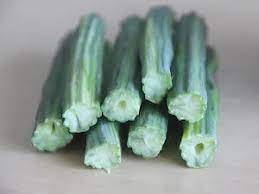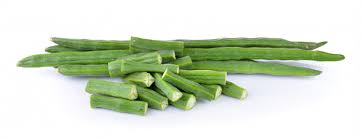Moringa pith, also known as “moringa core” or “drumstick core,” is the soft, tender, and fibrous tissue found inside the mature drumstick pods of the Moringa oleifera tree. Moringa oleifera is a fast-growing, drought-resistant tree native to South Asia but now cultivated in various parts of the world for its nutritional and medicinal properties.
The pith of the moringa pod is highly nutritious and is often consumed as a vegetable in many cultures. Moringa pith is rich in vitamins, particularly vitamin C, vitamin A, and various B vitamins, including folate. It contains essential minerals such as calcium, potassium, and iron. Moringa pith contains dietary fiber, which is beneficial for digestion and can help regulate bowel movements. It provides a modest amount of protein, making it a valuable addition to a vegetarian or vegan diet.
Moringa pith can be used in various culinary preparations, such as curries, soups, stir-fries, and stews. It has a mild flavor and can easily absorb the flavors of the dishes it’s cooked in. Additionally, moringa pith is often used in traditional medicine for its potential health benefits, which include anti-inflammatory and antioxidant properties.
The Economic Importance and Uses of Moringa Pith

Moringa pith, also known as the soft inner part of the drumstick tree (Moringa oleifera), has several economic importance and uses due to its nutritional and medicinal properties.
Here are some of the key economic uses and benefits of Moringa pith:
1. Nutritional Value: Moringa pith is rich in essential nutrients, including vitamins (such as vitamin C, vitamin A), minerals (like calcium, potassium), and protein. It is a valuable food source, especially in regions with malnutrition or limited access to other nutritious foods.
2. Medicinal Uses: Moringa pith has several medicinal properties. It is traditionally used to treat various ailments, such as inflammation, digestive disorders, and as a natural remedy for joint pain. The high vitamin and mineral content contribute to its therapeutic potential.
3. Natural Coagulant: Moringa pith contains natural coagulants that can be used in water purification. It can help remove impurities and contaminants from water, making it safer to drink. This is especially important in areas with limited access to clean drinking water.
4. Livestock Feed: Moringa pith can be used as a nutritious feed for livestock, including poultry and cattle. Its protein content makes it a valuable supplement for animal nutrition, contributing to increased milk and egg production.
5. Agricultural Fertilizer: Moringa pith can be used as an organic fertilizer. It contains nutrients that enhance soil fertility, which can lead to increased crop yields when used as a soil conditioner.
6. Cosmetic and Personal Care Products: Moringa pith is sometimes used in the production of cosmetic and personal care products. Its natural emollient properties can be beneficial in making moisturizers, shampoos, and soaps.
7. Biofuel Production: The oil extracted from Moringa seeds is used as a feedstock for biofuel production. While the pith itself is not a direct source of biofuel, the overall economic value of Moringa as a biofuel feedstock is significant.
8. Soil Erosion Control: Moringa trees, which produce the pith, are often used for soil erosion control and reforestation. This helps maintain soil quality and prevents land degradation, which is essential for sustainable agriculture.
9. Biodiesel Production: While the pith itself is not used for biodiesel, the seeds of the Moringa tree are a source of biodiesel, making the cultivation of Moringa economically important for biofuel production.
10. Pharmaceutical Research: The pith and other parts of the Moringa plant are of interest in pharmaceutical research due to their potential health benefits. Extracts from Moringa pith may be used in the development of dietary supplements and medicines.
11. Traditional Medicine: Moringa pith is used in traditional medicine systems in many cultures, contributing to the livelihood of local practitioners and traditional healers. Its healing properties are valued in these systems.
Read Also: Moringa Seeds: Economic Importance, Uses, and By-Products
12. Export and Trade: The economic importance of Moringa pith extends to international trade. Moringa and its products are often exported to various countries, generating income for farmers and traders.
The Products and By-products That Can Be Derived From Moringa Pith
Moringa pith, also known as Moringa oleifera, is a versatile plant known for its various parts that can be used for a wide range of products and by-products. The pith, which is the soft, inner part of the Moringa tree’s trunk, can be used in several ways.
Here is a list of products and by-products that can be derived from Moringa pith:
1. Moringa Pith Curry: The pith can be used to make a delicious curry, stew, or stir-fry.
2. Moringa Pith Soup: It is used to prepare nutritious soups.
3. Moringa Pith Pickle: The pith can be pickled with spices for a tangy condiment.
4. Moringa Pith Powder: After drying and grinding the pith, it can be turned into a nutrient-rich powder used in supplements or as a food additive.
5. Moringa Oil: The seeds of the Moringa plant are often used for oil extraction. While not directly from the pith, the oil is a valuable by-product of the Moringa plant.
6. Moringa Pith Residue: After oil extraction, the residue can be used as an organic fertilizer or soil conditioner.
7. Moringa Pith Feed: The pith can be used to feed livestock, as it contains valuable nutrients.
8. Moringa Pith Biomass: The dried pith can be used to produce biomass for biofuel, such as briquettes or pellets.
9. Traditional Medicine: In some traditional herbal medicine practices, Moringa pith is used to treat various ailments and promote overall well-being.
10. Water Clarification: Crushed Moringa pith can be used to clarify turbid water by acting as a natural coagulant to remove impurities and make water safer to drink.
11. Moringa Pith Art: The lightweight and fibrous nature of the pith makes it suitable for crafting and artwork, such as papermaking and sculpture.
12. Biodegradable Materials: Moringa pith can be used as a source of biodegradable packaging materials, reducing environmental impact.
13. Moringa Pith Mulch: The pith can be used as mulch or a soil amendment in gardening and horticulture.
14. Soap and Cosmetics: Extracts from the Moringa plant, including the pith, can be used in the production of soaps, shampoos, and cosmetics due to their natural cleansing and moisturizing properties.
In conclusion, moringa pith is a versatile and valuable resource with applications in food, agriculture, industry, and more. Its usage can vary depending on regional and cultural practices, as well as specific needs and opportunities in various industries.
Read Also: All You Need to Know About Cosmos Flower

